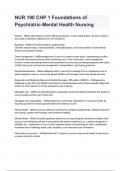NUR 190 CHP 1 Foundations of
Psychiatric-Mental Health Nursing
Asylum - ANSa safe refuge or haven offering protection; in the United States, the term "asylum"
was used to describe institutions for the mentally ill
Boarding - ANSin ED while awaiting inpatient beds
oShorter hospital stays, decompensation, rehospitalization, and dual problem of both mental
illness and substance abuse
Case management - ANSmanagement of care on a case-by-case basis, representing an effort
to provide necessary services while containing cost; in the community, case management
services include accessing medical and psychiatric services and providing assistance with tasks
of daily living such as financial management, transportation, and buying groceries
Deinstitutionalization - ANSa deliberate shift in care of the mentally ill from institutional care in
state hospitals to care in community-based facilities and through community-based services
Diagnostic and Statistical Manual of Mental Disorders, fifth edition (DSM-5) - ANStaxonomy
published by the APA; the DSM-5 describes all mental disorders and outlines specific diagnostic
criteria for each based on clinical experience and research
Managed care - ANSa concept designed to purposely control the balance between the quality of
care provided and the cost of that care
Managed care organization - ANSdeveloped to control the expenditure of insurance funds by
requiring providers to seek approval before the delivery of care
Mental health - ANSand social wellness evidenced by satisfying relationships, effective behavior
and coping, positive self-concept, and emotional stability
Mental illness - ANSa clinically significant behavioral or psychological syndrome or pattern that
occurs in an individual and that is associated with present distress (e.g., a painful symptom) or
disability (i.e., impairment in one or more important areas of functioning) or with a significantly
increased risk of suffering death, pain, disability, or an important loss of freedom
Phenomena of concern - ANSdescribe the 12 areas of concern that mental health nurses focus
on when caring for clients
, psychotropic drugs - ANSdrugs that affect mood, behavior, and thinking that are used to treat
mental illness
Self awareness - ANSthe process by which a person gains recognition of his or her own
feelings, beliefs, and attitudes; the process of developing an understanding of one's own values,
beliefs, thoughts, feelings, attitudes, motivations, prejudices, strengths, and limitations and how
these qualities affect others
Standard of care - ANSauthoritative statements by professional organizations that describe the
responsibilities for which nurses are accoTABLE; the care that nurses provide to clients meets
set expectations and is what any nurse in a similar situation would do
Utilization review firms - ANSdeveloped to control the expenditure of insurance funds by
requiring providers to seek approval before the delivery of care
Mental health - ANSDifficult to define
Has no single universal definition
Has many components influenced by wide variety of factors
Dynamic ever changing state
Influencing factors are:
Individual(personal)
Interpersonal (relationship)
Social/cultural (environmental)
Mental illness #1 - ANSincludes disorders that affect mood, behavior, and thinking, such as
depression, schizophrenia, anxiety disorders, and addictive disorders
Mental disorders often cause significant distress or impaired functioning or both
What factors contribute to mental illness ? - ANSIndividual : biological makeup, intolerable or
unrealistic worries or fears
Interpersonal: ineffective communication, inadequate social support
Social/cultural: unwarranted negative view of the world , discrimination (stigma, racism,
classism,ageism and sexism)
DIAGNOSTIC AND STATISTICAL MANUAL OF MENTAL DISORDERS - ANSDSM-5:
taxonomy published by the American psychiatric association
The DSM-5 has three purposes:
•To provide a standardized nomenclature and language for all mental health professionals
•To present defining characteristics or symptoms that differentiate specific diagnoses
•To assist in identifying the underlying causes of disorders
DSM-5 The classification system allows the practitioner to identify all the factors that relate to a
person's condition: - ANS•All major psychiatric disorders such as depression, schizophrenia,
anxiety, and substance-related disorders




